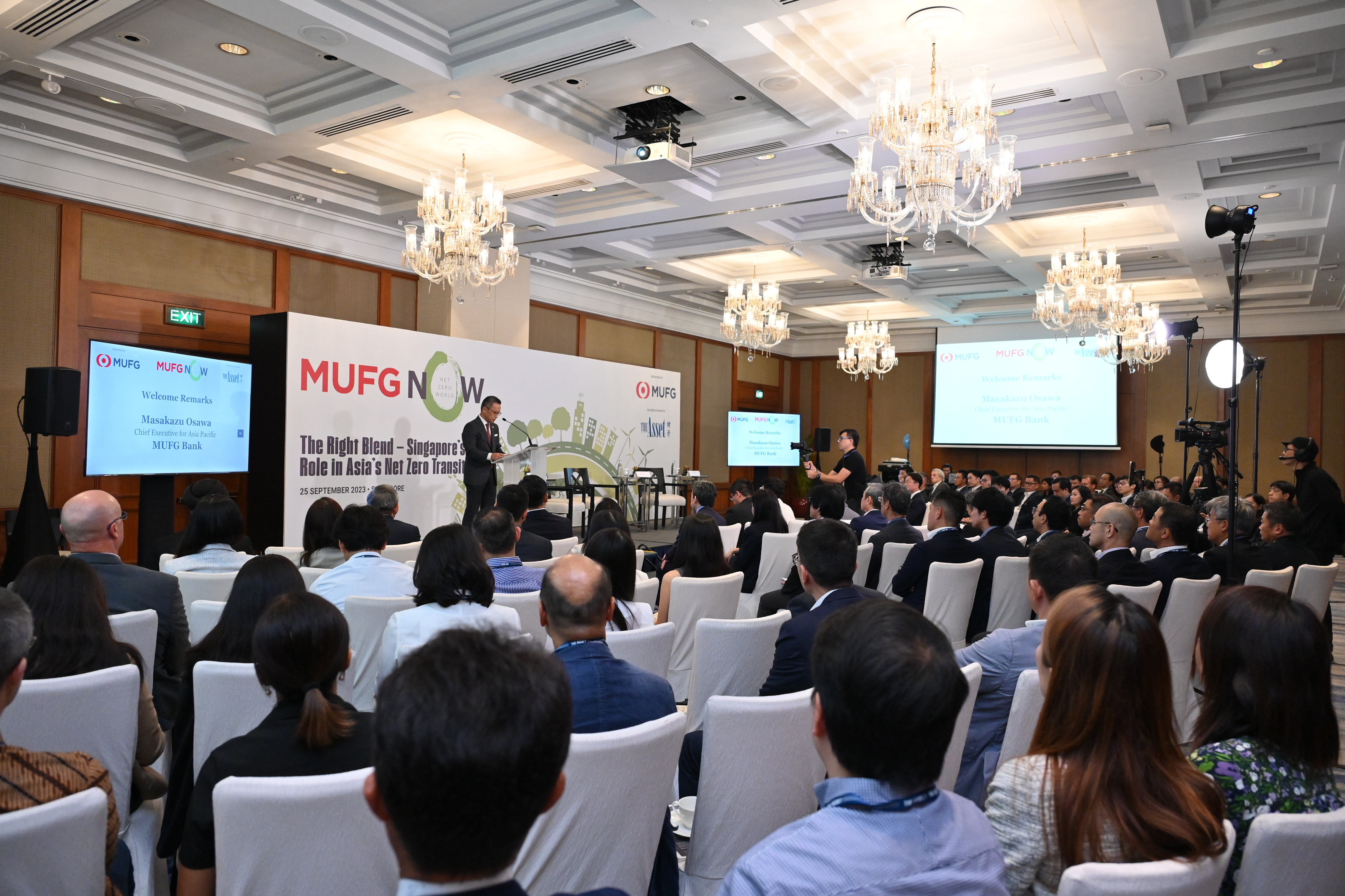Asia, being one of the most vulnerable to climate change, plays a crucial role in the global efforts towards achieving net zero.
With the aim of steering concerted action towards this common goal, as well as sorting out the complexities of this worldwide drive, The Asset Events worked alongside MUFG as part of its MUFG N0W series to launch a series of discussions and interactions among stakeholders on this critical issue.
“Striving towards a net-zero world is a long-term aspiration and goal that we as a global community will have to work towards for the benefit of our future generations,” states Masakazu Osawa, MUFG Bank chief executive for Asia-Pacific, in his opening remarks at the launch of the series in Singapore on September 25.

His remarks were followed by a fireside chat, which detailed the evolution of Asia’s decarbonization journey.
Colin Chen, head of ESG finance, Asia-Pacific, at MUFG Bank, stresses the importance of transition for the region to achieve net zero. “Everyone has a net-zero target already in their minds. While the target timeframe might be different, the momentum is for all of us to reach net zero. While Asia has the highest carbon footprint in the world, we do possess the largest amount of people compared to other regions, so on a per capita basis we are not doing so bad.”
Key enabler
Banks and institutional investors play a critical role in supporting efforts by enterprises and communities to reduce their carbon footprint. “Finance is a key enabler to get to net zero. We are seeing a shift in the financing towards the brown economy to the green economy,” says Yuki Yasui, managing director, Asia Pacific Network, Glasgow Financial Alliance for Net Zero (GFANZ).
“The investment in renewable energy doubled in the last two years and we have seen a massive shift in 2023. Decades ago, the ratio between fossil fuel investment and renewable energy investment would’ve been 1:0 but today it is nearly 1:1. For every dollar of investment that you are making in fossil fuel, there is going to be another dollar heading towards renewables,” Yasui shares.
While there has been impressive progress in the field of energy transition, the task to reduce greenhouse gas emissions remains urgent. “We know with absolute certainty that the two main drivers of climate change are greenhouse gas emissions from a variety of human related resources and deforestation. When you combine all of that, the equivalent of around 51 billion tonnes of carbon dioxide a year is emitted into the atmosphere and it drives climate change,” explains Winston Chow, co-chair of working group II at the Intergovernmental Panel on Climate Change.
Further engagement and sharing on best practices are critical going forward, according to speakers at the panel discussion that followed the fireside chat.
“Around 90% of the world’s young coal-fired power plants are here in Asia. You need to tackle this if you want to impact climate change,” says Jackie Surtani, regional director, Singapore office, at the Asian Development Bank. “We can talk a lot about renewable energy financing, but if you don’t do anything about shortening the asset life of those coal-fired power plants, we are never going to get there. We need to also talk more about blended finance and consolidating the pools of concessional finance together.”
Tomohiro Ishikawa, chief regulatory engagement officer at MUFG Bank, also stresses the need for collaboration. “The more time we spent on our net-zero journey, the more we learned by engaging with our clients and policymakers. It has been a steep learning curve but we are all learning together. The initial motivation might have been the commitment of our CEO to net zero, but now we are proactively engaging different stakeholders and explaining how we are pursuing net zero and how policymakers could help us,” he says.
Investment opportunities
The panellists agree that the most important aspect of the journey to net zero in Asia is working with traditional carbon-intensive industries and getting them to change their ways.
“When it comes to climate change, we think of the range of investment opportunities in three broad buckets. On one end of the spectrum, you have dirty assets which are very carbon-intensive with significant asset stranding risk. On the other side of the spectrum, you have very green companies, your climate solution providers like your renewable energy companies,” says De Rui Wong, senior vice-president at GIC’s sustainability office. “Where the river of opportunity is potentially the widest and deepest – the companies that are in transition – they may be high-carbon today, but many of them are committed to transforming their businesses to lower-carbon, greener business models.”
This firm commitment to transition can positively influence businesses to future-proof their operations as net-zero requirements and regulations become more critical.
Narrating his company’s transition journey, RGE vice-chairman Soo Khiang Bey says: “Our chairman himself has always wanted all our businesses to operate on the basis of five C’s, that we must do good for the country, community, climate, customer and company. In 2015 came the UNSDGs (United Nations’ Sustainable Development Goals) and based on those goals, we need to create a transition plan and each business came together to do this.
“This transition plan addresses all our stakeholders in terms of decarbonization. We focused a lot on reduction, we went down into the plant to really look at operations, and reduced excessive consumption of energy, water and chemicals.”
In his closing remarks, Tomokazu Hikita, country head of Singapore at MUFG Bank, also underscores the importance of collaboration in achieving net zero. “At MUFG, we take our commitment to society, our clients and partners very seriously, and we firmly believe in the importance of constant engagement and communication in empowering a more sustainable brighter future for everybody,” he says.
For more information about the event, please go here.









